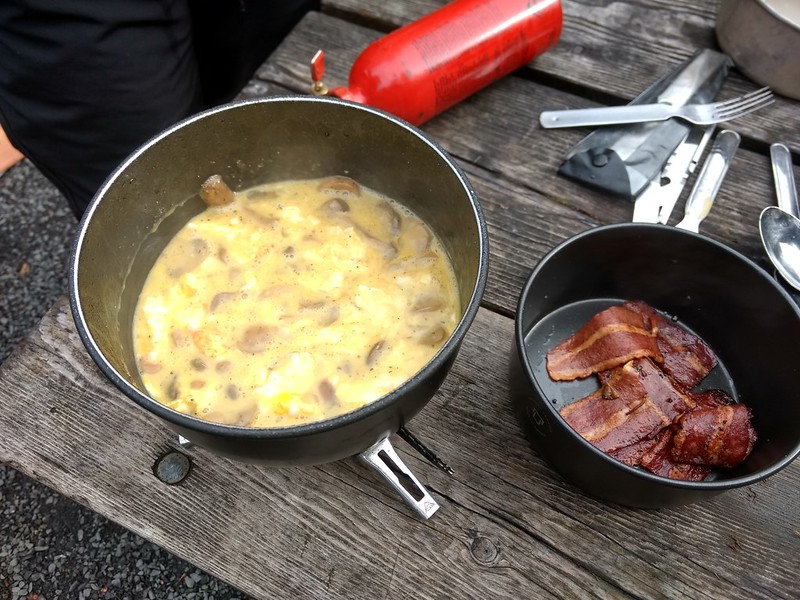
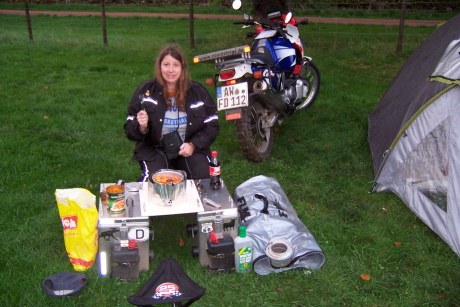
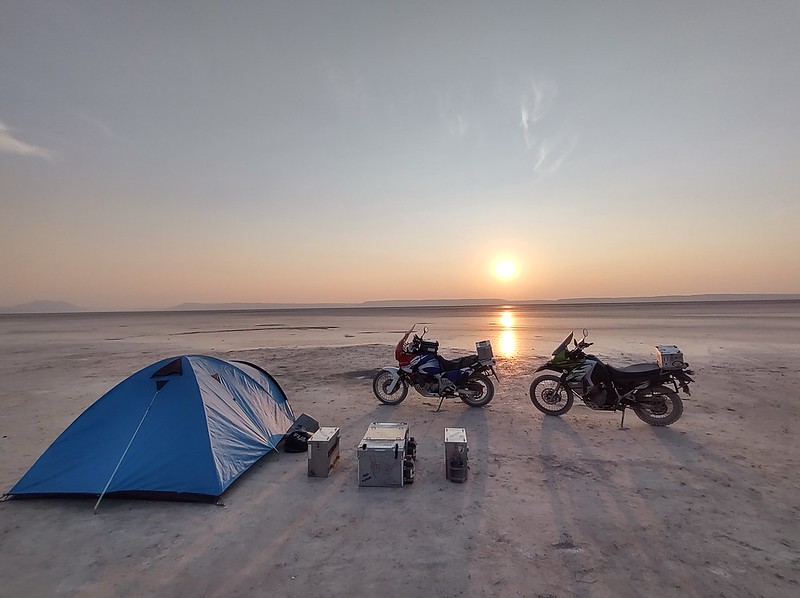
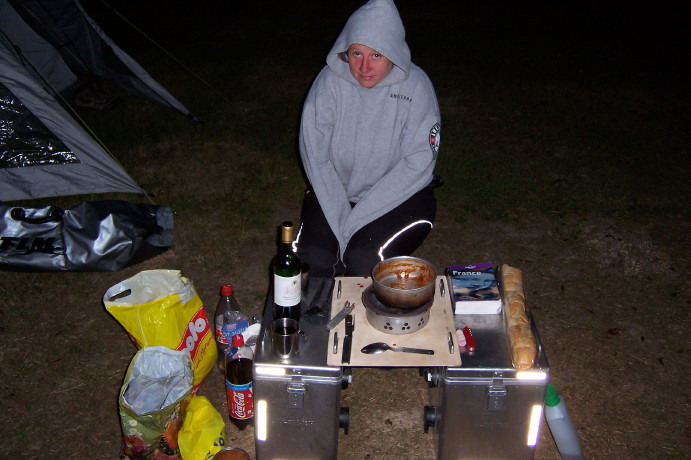

Coyotebroad's
Advice for Women Motorcycle Travelers
(especially those who camp):
Meals on the Road
While Traveling By Motorcycle
disclaimer
If you want to eat just at restaurants while on a motorcycle
road trip, that is absolutely fine! If you have the money and will
be somewhere that has ready-to-eat food available, why not? Eating
at restaurants has three big benefits: you get to save SO much
room when you pack, you get to enjoy wherever you are staying
instead of having to cook and clean, and you get to experience
either local cuisine or something convenient.
However, many of us don't have the resources to eat out for
every meal, or even most meals, even when we aren't on a
motorcycle trip. Also, many motorcyclists like to tent camp, and
we like to camp in places where a restaurant may be many
miles away. We also might want a beer or two with our meal, and
we're mindful that drinking and riding is a horrible idea. We
may just like the idea of setting up camp early and not going
anywhere until after breakfast the next morning. If any of those
scenarios describe you - meaning you need to prepare food at
your campsite - then this page is for you.
One caution right up front: you should NEVER ride when you are
famished. Hungry riders make poor decisions. Always have snack
bars or fruit you can eat if you are going to have to skip
proper meals.
Some general tips for eating while traveling by
motorcycle:
- Don't pack and try to eat something on the road that you
don't like at home. If you don't normally snack on rice cakes,
don't think you are going to magically develop a taste for
them while traveling. If you are going to bring your food for
meals, focus on things you like to eat when you aren't on a
motorcycle trip.
- There's no shame in getting food from a USA-based fast food
restaurant. None. Sometimes, what you are in the mood for is a
burger from Wendy's, and that's OK. Sometimes, it's just what
is most convenient and is going to allow you to spend more
time enjoying the road or a great place you are staying. Food
shaming is stupid.
- Your trip isn't some how more authentic if you cook your
meals.
- You do not want to spend inordinate amounts of time cooking
and then cleaning pots and dishes. Don't get so elaborate in
the name of cooking some big "proper" meal that your evenings
and mornings are spent working to prepare a meal and then
cleaning up instead of enjoying a lovely campfire and an adult
beverage and the scenic views all around you and maybe the
good company you are in as well.
- Almost every gas station has some kind of food. So many gas
stations even have hot meals now. I won't say they are
healthy, but it's rare you are going to be in a literal food
desert in the USA. In other countries, tiendas, gas stations
and other places may not have any ready made food - only
potato chips - or there might be the most amazing food ever at
a completely out-of-the-way roadside place, made by a local
woman (cash only though!).
What we pack for meals on a motorcycle
trip:
This is going to sound like a lot. But it's not - this packs
down very small. And as I say a few times here, we never have ALL
of this on the bike at the same time.
Items in support of cooking, meal time,
cleanup:
- cooking oil (this can be used not only with rice, but also as
a substitute in recipes that call for butter or margarine; make
sure the small bottle you bring it in can be TIGHTLY closed;
putting it in a plastic bag as well is a good idea, to prevent
any oil spills while packed)
- instant hot chocolate
- instant coffee
- powdered creamer
- sugar
- salt
- pepper
- chili powder
- curry
- paprika
- garlic powder
- onion powder
- (I love those all-in-one containers with salt, pepper, chili
powder, etc. in them)
- bouillon cubes or powder
- a container for extra drinking water - you can use a tough,
clear plastic bottle that had soda in it, or you can use what we
use: a super-durable water container from coyotetrips
(my husband). But you absolutely need to always have
some drinking water. We make sure it's filled before we leave
every morning. We've tried the plastic, foldable pouches, but
they've always developed holes at their folding points.
- backpack camping stove (the kind that uses any kind of fuel
is best, IMO, because then you don't have to carry special fuel
for the stone - you can use the same gas you put in your
motorcycle) and the metal container that attaches to the stove
(for fuel).
- fuel bottle to carry extra fuel for camp stove, if the stove
uses something different than the same gas you put in your bike
(which we don't).
- at least two cooking pots, which fit into each other -
nesting pots - and one of which is non-stick (we take four pots
- they all fit into each other, two are non-stick, and four
don't take up any more room than two because of the nesting)
- camping utensils (knife, fork and spoon all fit together, one
set for each person; we also use our Swiss army knives as
needed)
- collapsible plastic camping spatula (for stirring and
sometimes for serving - our metal camping utensils would scar
the non-stick pans if I used them to cook)
- collapsible sink (not every site has a sink for washing
dishes; can also be used for washing underwear in really
primitive conditions, or even for hot water to wash your face if
no bathroom is available, or hot water to rinse your hair)
- dish washing liquid (use a small bottle and put the bottle
into a zip lock bag - trust me on this)
- a camping towel for dish use only; my husband bought a big
camping towel and then cut it so that there was a small towel
for washing dishes and the remainder was for drying, and because
we bought it at a camping store, it came in a little, very handy
mesh carrying bag
- scouring pad for dish washing (folds in with the dish towels)
- some paper towels (it's impossible to get all of the food out
of cooking pots and not ruin your cleaning sponge or rags
otherwise)
- 2-3 plastic grocery bags for trash
Believe it or not, except the cooking pats, the stove, the fuel,
the bouillon cubes and the hot chocolate, all of the
aforementioned fit into a small bag - we use a bag that's
supposed to be to carry a lunch, that's supposed to keep that
lunch somewhat cool. It's maybe 12 inches tall, 5 inches wide and
3 inches deep. Yes, really.
Food that doesn't have to be refrigerated
We do not have ALL of these all the time - we start with items
that would make one or two supper meals and then pick things up as
we travel and run out of things:
- two cans of ready-made food (soup or a stew) for one supper
meal
- two different Tasty Bite Indian meals in pouches (terrific
over the Tasty Bite rice or over other rice or just on its own,
but note, it's liquid, and while the packaging is tough, a
rupture in your luggage would be disgusting) - altogether, this
is one supper meal
- can of tomatoes, to mix in with rice or pasta or scrambled
eggs
- dried pasta
- an onion (if we're going to have scrambled eggs or pasta - I
sauté them in oil or the juice from the canned tomatoes first)
- instant potatoes (great to have with sausage or a chicken
breast bought that day at a gas station)
- rice (regular or something in a pouch that's just ready to
heat with a bit of water)
- instant oatmeal
- snack bars and/or breakfast bars
- trail mix or nuts
- turkey jerky (the only kind of jerky I like)
- single-serving peanut butter containers
- Betty Crocker Bisquick Complete Buttermilk Biscuit Mix (just
add water)
Packets of salt, pepper, sugar, coffee and creamer from hotels
and airports are awesome to save up for motorcycle trips, but be
sure you pack them in a zip-lock baggie.
Sometimes we carry tortillas and buy a can of black beans, an
avocado and a small can of salsa to make bean burritos for a
supper and then breakfast burritos the next morning or the one
after that.
You can buy fresh produce (like apples, oranges, bananas,
avocados, etc.), eggs and bread on the road, but note that you may
need to transport such from a few feet to a several miles, and
fresh produce don't stay fresh for long in motorcycle gear.
I also carry squeezable condensed milk for my coffee. I LOVE
COFFEE and I love creamer but I find powdered creamer barely
drinkable and end up dumping a stupid huge amount of sugar into my
coffee when camping unless I have a LOT of milk or creamer. The
small package of condensed milk is like frosting and in my coffee,
it's magic.
The first night out, I might bring a bit more elaborate meal I
have already cooked at home and I heat it up on the camping stove
that first evening.
Food that DOES have to be refrigerated:
My husband straps a small hard-sided cooler bag to the top of his
panniers (it's about 10 X 10 X 5) , and it has been a heavenly
thing to have - we buy ice each evening before we stop to camp for
the night and any other groceries (beer!) we need.
What we carry in the cooler (we usually don't have ALL of these
things all the time):
- six eggs (to have within 48 hours for breakfast)
- turkey bacon (I don't eat pork) - I love to cook the bacon,
then cook the eggs in the grease (not much with turkey bacon),
then throw it all in a tortilla, if we have such, or just eat it
as is, with seasoning.
- pint of milk
- lunch meat (my husband likes this for breakfast with bread -
or as a light supper)
Remember that raw eggs stay fresher longer than boiled eggs, but
the latter is less fragile, and either should never get hot
between meals.
The first night out, since we're leaving from our house, I might
take a stick of butter and use it as needed for meals until it's
gone. But for anything out on the road where I might need butter,
once I'm out, I substitute oil.
I take an empty margarine tub or two for transporting fragile
food items, and if at some point I need extra room, near the
end of the trip, I might throw those tubs away - no big loss (I've
usually reused them so much I don't at all feel guilty). You want
very tough containers for items that go into the cooler or that
you absolutely do not want to leak - things that will close,
absolutely, and remain somewhat water-tight.
If a town is near enough, we'll get our camp site, unpack, and
while I set up the tent, my husband goes on a beer and wine run (I
love the small cartons of wine you can get at most grocery stores
or convenience stores in the USA - also known as adult juice
boxes!).
What we eat while camping:
My husband wants smoked meat slices and bread for breakfast (he's
German). I have oatmeal, a peanut butter sandwich or a little lunch
box size tub of peanut butter for breakfast if he has that. And we
always have instant coffee, every morning. That means, every
morning, the stove has to be fired up.
Sometimes for breakfast, we splurge, and I cook scrambled eggs,
mixed with tomatoes or other veggies we bought the night before
and some of our herbs and spices, if we found find eggs and fresh
or canned produce easily the night before and don't have to buy a
full dozen eggs at once. I've bought turkey bacon the night
before, cooked the entire package up the next morning and then
cooked the eggs in the bacon grease on the cook stove, if we're
able to keep everything cool the night before. It's heavenly.
We haven't tried the biscuit thing yet - remember, we've just got
a camping stone - but we will at some point (I'll try cooking
biscuits three at a time)
For lunch, we usually stop at a restaurant, shop or food cart,
unless we've had a crazy big breakfast. Most gas stations in the
USA have hot food. We may even just snack on snack bars and jerky
and an apple for lunch. In other words, we prefer not to have to
pack food for lunch. The break in the day for lunch is often a
much-needed rest from riding more than it is for food.
For supper, if we haven't had a real lunch:
- I cook something out of a can (ravioli, Chunky soup, Progresso
soup, beef stew, etc.). You might be amazed at just how many
different kinds of Chucky soup and Progresso soup are out there,
BTW.
- I put together an Indian meal from those Tasty Bite pouches
- I cook pasta with tomatoes and herbs/spices, rice with
whatever fresh or canned produce I can find, like an onion (and
even a cooked chicken breast from the deli department of a
nearby grocery or even a gas station).
- I cook beef or turkey wieners or brats with instant potatoes
that don't require milk or butter.
Sometimes I pick up a can of pineapple and we eat that for desert
- or even for breakfast the next day.
To drink? For supper, see previous note about beer and wine. For
breakfast, coffee. All day: water.
We're not fond of just-add-water camping food, mostly because
it's TOO FREAKIN' EXPENSIVE.
But what about
recipes out of a camp cook book?!
I've attended workshops in campsite cooking, I've looked through
a few camping cookbooks, and I just do NOT see the point of so
much work while camping by motorcycle. Why would you want to take
up all that room to pack even more stuff, spend time out on the
road seeking out particular ingredients, and spend so much time
cooking and cleaning after a long day of riding a motorcycle? I
save my elaborate camp cooking for when we are in our camping
trailer and can have a lot more ingredients, cold storage that
lasts more than one night, a lot more cooking pots (including a
cast iron dutch oven) and both a camp fire and a larger camp
stove.
Always
- We ALWAYS pack up our trash and take it to a trash can, even
when we camp rough. And we take our beer bottles too - either to
a trash can or a recycle station. Twice though, we camped in a
really remote area and the way in and out was a really rough
road. We were worried about making it out with the trash and
beer bottled. We asked some car campers that were also leaving
if they were willing to take them and they were MORE than happy
to do so.
- I always use waste water pits if they are available. I try to
get absolutely all of the food waste in a finished meal into the
bag we use for garbage, so that most of what goes down the waste
water drain is just soapy water. I do the same for the water I
use to brush my teeth. If there are no waste water pits, I
schlep several yards from whatever water source is nearby (lake,
river, stream, etc.). I NEVER put such in a pit toilet. Please
be kind to the environment and do the same - it's a few extra
steps away from your immediate camp site, but it's worth it.
Also see my pack list for
other items we take.
And now a word from my husband:
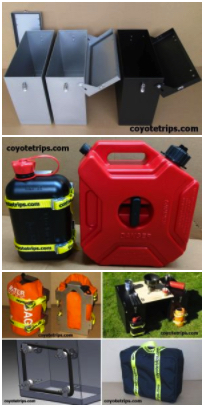
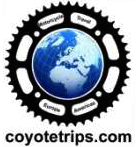
Adventure Motorcycle
Luggage & Accessories
www.coyotetrips.com
Aluminum Panniers and Top Cases,
Top Case Adapter Plates,
Tough Motorcycle Fuel Containers, & More
Designed or Curated by an experienced adventure motorcycle
world traveler
Based in Oregon
You won't find these exact products anywhere else;
these are available only from Coyotetrips
(my husband)
Disclaimer
Any activity incurs risk. The author assumes no responsibility for
the use of information contained within this document.
Comments are welcomed, and motivate me to
keep writing -- without comments, I start to think I'm talking to
cyberair.
 Quick Links
Quick Links 
about Jayne Cravens
contact me
 Follow
me! @jayne_a_broad
(coyotebroad)
Follow
me! @jayne_a_broad
(coyotebroad)
My tweets are about travel, motorcycling, camping, bicycling (as a
commuter), politics and things I find amusing. Eric Idol has replied
to me twice. No, really!
 become
Coyote Broad's fan on Facebook
become
Coyote Broad's fan on Facebook
Posts are only about travel, hiking and camping
Getting Started as a Motorcycle Rider: My
Journey (Tips for Women Who Want To Ride)
My Travel Maps
Coyotebroad
in Germany | in Afghanistan
| in Ukraine
Coyotebroad
adventures in Europe, Africa, as well as road trips in the USA
women
travelers: general information and advice (especially for women
novice travelers, NOT geared towards just motorcycle riders)
Saving Money for
Travel (or to pay off your debt)
transire
benefaciendo: "to travel along while doing good." advice for those
wanting to make their travel more than sight-seeing and shopping.
Permission is
granted to copy, present and/or distribute a limited amount of
material from my web site without charge
if the information is kept intact and is credited to Jayne
Cravens.
Please contact me for permission to
reprint, present or distribute these materials.
The art work and material on
this site was created and is copyrighted 1996-2019
by Jayne Cravens, all rights reserved
(unless noted otherwise, or the art comes from a link to another web
site).











